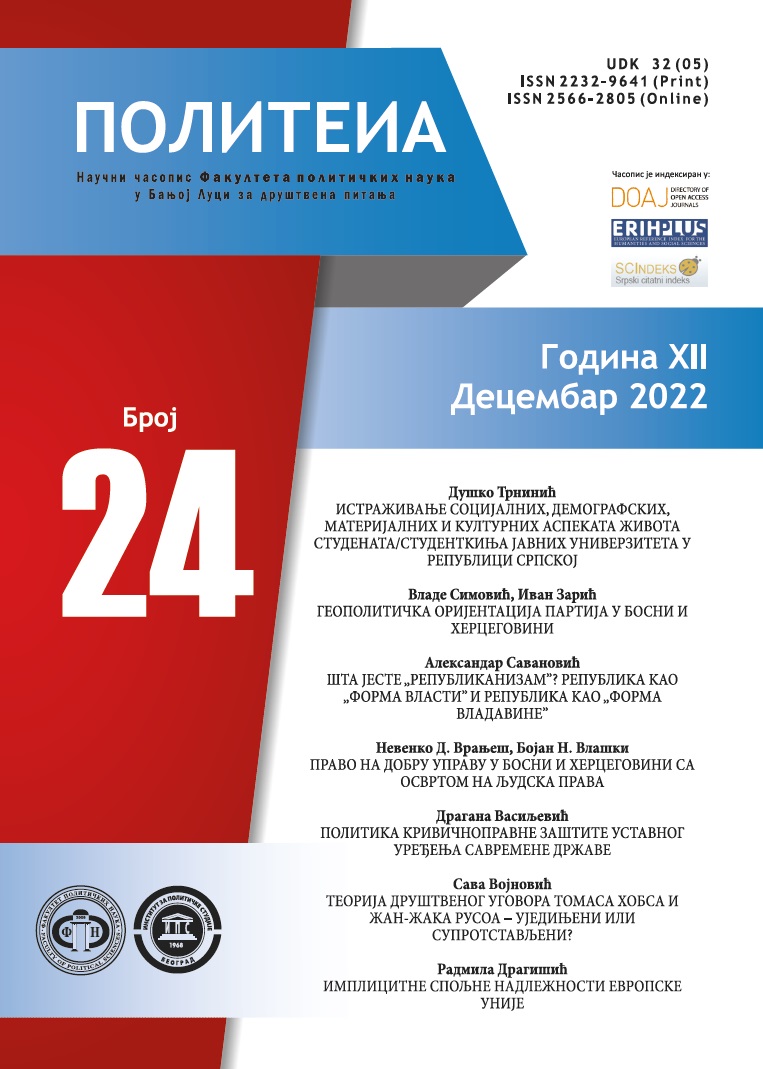POLICY OF CRIMINAL LAW PROTECTION OF THE CONSTITUTIONAL ORDER OF THE MODERN STATE
Abstract
The policy of criminal law protection of the constitutional order as a part of the overall social policy has been greatly changed in the modern state. This rational and organized activity is focused on protection of the constitutional order by incriminating certain socially unacceptable behaviors. This is one of the social goals that has always been present, determined by socio-political forces. Although incrimination of certain behaviors, regardless of the immediate object of criminal law protection, indirectly serves the protection of society as a whole, the article emphasizes the features of incriminations that are directly aimed at protecting the constitutional order and political order of the state. This segment of criminal law protection, given the security challenges and threats to which the modern state is subject, has necessarily undergone certain changes. It is about expanding the zone of criminality, that is, the emergence of new incriminations, but also a much different position of the perpetrators of the so-called political criminal offences.
References
Babić, M., Marković, I. (2019). Krivično pravo – opšti dio. Banja Luka: Pravni fakultet.
Bačić, F. (1978). Komentar Krivičnog zakona Socijalističke Federativne Republike Jugoslavije. Beograd: Savremena administracija.
Bassiouni, C.M. (1969). Ideologically Motivated Offenses and the Political Offenses Ideologically Motivated Offenses and the Political Offenses Exception in Extradition ˋ A Proposed Juridical Standard for an Exception in Extradition ‒ A Proposed Juridical Standard for an Unruly Problem. Law Review DePaul Law Review, 19(2): 217–265. Posjećeno 1. 3. 2022. URL: https://via.library.depaul.edu/cgi/viewcontent.cgi?referer=&httpsredir=1&article=3002&context=law-review>
Bock, S. & Harrendorf, S. (2014). Strafbarkeit und Strafwürdigkeit tatvorbereitender computervermittelter Kommunikation. Zeitschrift für die gesamte Strafrechtswissenschaft, 126: 337–381.
Bozbayindir, E. (2017). The advent of preventive criminal law: an erosion of the traditional criminal law. Criminal law forum, 29(1): 25–62.
Buha, M. (2021). Smetnje za izvršenje Evropskog naloga za hapšenje i predaju. Evropsko zakonodavstvo, 76: 81–97.
Cantrell, C.L. (1977). The Political Offense Exemption in International Extradition: A Comparison of the United States, Great Britain and the Republic of Ireland. Marquette Law Review, 60(3): 777–824. Posjećeno 27. 4. 2022. URL: https://scholarship.law.marquette.edu/cgi/viewcontent.cgi?article=2184&context=mulr>
Conford, A. (2015). Preventive Criminalization. New Criminal Law Review: An International and Interdisciplinary Journal, 18(1): 1–34.
Đurđić, V. (2012). Evropski nalog za hapšenje. Zbornik radova Pravnog fakulteta u Novom Sadu, 1: 21–37.
Evropska konvencija o ekstradiciji 1957. (1957, decembar 13). Posjećeno 27. 5. 2022. URL: https://rm.coe.int/16802e8726>
Ferrari, R. (1920). Political Crime. Columbia Law Review, 20(3): 308–316.
Green, N.M. (1991). Comment: In the Matter of the Extradition of Atta: Limiting the Scope of the Political Offense Exception. Brooklyn Journal of International Law, 17(2): 447–472. Posjećeno 14. 5. 2022. URL: https://brooklynworks.brooklaw.edu/cgi/viewcontent.cgi?article=1839&context=bjil>
Jansson, J. (2020). Terrorism, Criminal Law and Politics ‒ The Decline of the Political Offence Exception to Extradition. London – New York: Routledge.
Kapferer, S. (2003). Legal and Protection Policy Research Series ‒ The Interface between Extradition and Asylum. Geneva: United Nations High Commissioner for Refugees.
Konvencija o sprečavanju i kažnjavanju zločina genocida 1948. (1948, decembar 9). Posjećeno 20. 5. 2022. URL: http://www.preventgenocide.org/yu/pravo/konvencija.htm>
Krivični zakonik Republike Srpske („Sl. glasnik RS“, br. 64/2017, 104/2018, 15/2021 i 89/2021). Posjećeno 19. 1. 2022. URL:https://www.paragraf.ba/propisi/republika-srpska/krivicni-zakon-republike-srpske.html>
Lečić, B. (2018). Evropski nalog za hapšenje – nastanak, razvoj i funkcija. Vojno delo, 6: 52–69.
Lynn, R.H. (1971). Air High Jacking as a Political Crime ‒ who Should Judge? California Western International Law Journal, 2(1): 92–108. Posjećeno 14. 4. 2022. URL: https://scholarlycommons.law.cwsl.edu/cgi/viewcontent.cgi?article=1016&context=cwilj>
MacCormack, A. (2009). The United States, China, and Extradition: ready for the next step? Legislation and Public Policy, 12: 445–497. Posjećeno 11. 5. 2022.URL: https://www.nyujlpp.org/wp-content/uploads/2012/11/Anna-MacCormack-The-United-States-China-and-Extradition-Ready-for-the-Next-Step-.pdf>
McConkie, T.J. (2013). State Treason: The History and Validity of Treason Against Individual States. Kentucky Law Journal, 101(2): 281–336.
Nagy, S. L. (1991). Political Offense Exceptions to United States Extradition Policy: Aut Dedere Aut Judicare (Either Extradite or Prosecute). Ind. Int'l & Comp. L. Rev., 1: 109–149.
Packer, H.L. (1962). Offenses Against the State. The Annals of the American Academy, 339: 77–89.
Petersen, A.C. (1992). Extradition and the Political Offense Exception in the Suppression Extradition and the Political Offense Exception in the Suppression of Terrorism. Indiana Law Journal, 67(3): 767–796. Posjećeno 14. 4. 2022. URL: https://www.repository.law.indiana.edu/cgi/viewcontent.cgi?article=1443&context=ilj>
Savić, S., Savić, M. (2017). Teorija države i prava. Banja Luka: Komesgrafika.
Schafer, S. (1972). The Concept of the Political Criminal. The Journal of Criminal law, Criminology and Politice Science, 62(3): 380–387. Posjećeno 3. 4. 2022.URL:https://scholarlycommons.law.northwestern.edu/cgi/viewcontent.cgi?article=5732&context=jclc>
Sladoje, N. et al. (2006). Međunarodna pravna pomoć. Sarajevo: Ministarstvo pravde Bosne i Hercegovine.
Szabo, D. (1972). Political Crimes: A Historical Perspective. Denver Journal of International Law & Policy, 2(1): 7–22. Posjećeno 4. 3. 2022. URL: https://digitalcommons.du.edu/cgi/viewcontent.cgi?article=2154&context=djilp>
Van Den Wijngaert, C. (1983). The Political Offence Exception to Extradition: Defining the Issues and Searching a Feasible Alternative. Report presented at the International Seminar on Extradition, International Institut of Hig- her Studies in criminal Sciences. Posjećeno 22. 4. 2022. URL: fromhttp://rbdi.bruylant.be/public/modele/rbdi/content/files/>
Vuković, I. (2021). Кrivično pravo – opšti deo. Beograd: Pravni fakultet. (Vuković, I. (2021). Кrivično pravo – opšti deo. Beograd: Pravni fakultet).
Autori koji objavljuju u ovom časopisu pristaju na sljedeće uslove:
- Autori zadržavaju autorska prava i pružaju časopisu pravo prvog objavljivanja rada i licenciraju ga "Creative Commons Attribution licencom" koja omogućava drugima da dijele rad, uz uslov navođenja autorstva i izvornog objavljivanja u ovom časopisu.
- Autori mogu izraditi zasebne, ugovorne aranžmane za neekskluzivnu distribuciju članka objavljenog u časopisu (npr. postavljanje u institucionalni repozitorijum ili objavljivanje u knjizi), uz navođenje da je članak izvorno objavljen u ovom časopisu.
- Autorima je dozvoljeno i podstiču se da postave objavljeni članak onlajn (npr. u institucionalni repozitorijum ili na svoju internet stranicu) prije ili tokom postupka prijave rukopisa, s obzirom da takav postupak može voditi produktivnoj razmjeni ideja i ranijoj i većoj citiranosti objavljenog članka (Vidi Efekti otvorenog pristupa).

